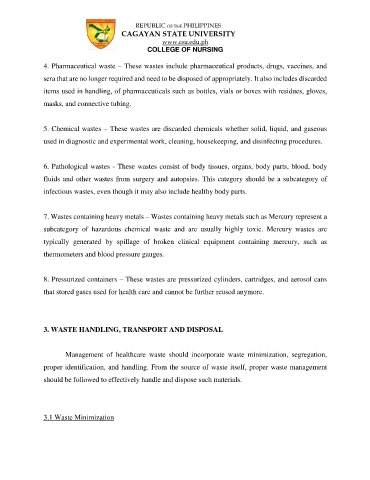Page 2289 - Documents for the COPC of BS Nursing Program
P. 2289
REPUBLIC OF THE PHILIPPINES
CAGAYAN STATE UNIVERSITY
www.csu.edu.ph
COLLEGE OF NURSING
4. Pharmaceutical waste – These wastes include pharmaceutical products, drugs, vaccines, and
sera that are no longer required and need to be disposed of appropriately. It also includes discarded
items used in handling, of pharmaceuticals such as bottles, vials or boxes with residues, gloves,
masks, and connective tubing.
5. Chemical wastes – These wastes are discarded chemicals whether solid, liquid, and gaseous
used in diagnostic and experimental work, cleaning, housekeeping, and disinfecting procedures.
6. Pathological wastes - These wastes consist of body tissues, organs, body parts, blood, body
fluids and other wastes from surgery and autopsies. This category should be a subcategory of
infectious wastes, even though it may also include healthy body parts.
7. Wastes containing heavy metals – Wastes containing heavy metals such as Mercury represent a
subcategory of hazardous chemical waste and are usually highly toxic. Mercury wastes are
typically generated by spillage of broken clinical equipment containing mercury, such as
thermometers and blood pressure gauges.
8. Pressurized containers – These wastes are pressurized cylinders, cartridges, and aerosol cans
that stored gases used for health care and cannot be further reused anymore.
3. WASTE HANDLING, TRANSPORT AND DISPOSAL
Management of healthcare waste should incorporate waste minimization, segregation,
proper identification, and handling. From the source of waste itself, proper waste management
should be followed to effectively handle and dispose such materials.
3.1 Waste Minimization

